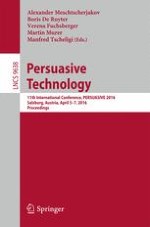2016 | OriginalPaper | Buchkapitel
Understanding Changes in the Motivation of Stroke Patients Undergoing Rehabilitation in Hospital
verfasst von : Michelle Pickrell, Bert Bongers, Elise van den Hoven
Erschienen in: Persuasive Technology
Aktivieren Sie unsere intelligente Suche, um passende Fachinhalte oder Patente zu finden.
Wählen Sie Textabschnitte aus um mit Künstlicher Intelligenz passenden Patente zu finden. powered by
Markieren Sie Textabschnitte, um KI-gestützt weitere passende Inhalte zu finden. powered by
